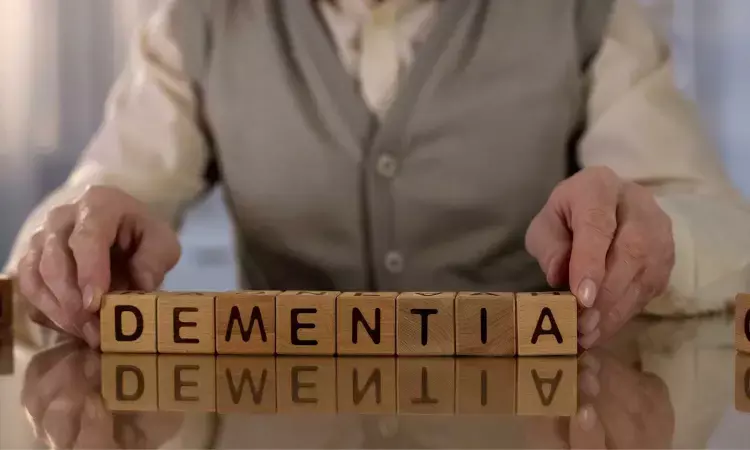- Home
- Medical news & Guidelines
- Anesthesiology
- Cardiology and CTVS
- Critical Care
- Dentistry
- Dermatology
- Diabetes and Endocrinology
- ENT
- Gastroenterology
- Medicine
- Nephrology
- Neurology
- Obstretics-Gynaecology
- Oncology
- Ophthalmology
- Orthopaedics
- Pediatrics-Neonatology
- Psychiatry
- Pulmonology
- Radiology
- Surgery
- Urology
- Laboratory Medicine
- Diet
- Nursing
- Paramedical
- Physiotherapy
- Health news
- Fact Check
- Bone Health Fact Check
- Brain Health Fact Check
- Cancer Related Fact Check
- Child Care Fact Check
- Dental and oral health fact check
- Diabetes and metabolic health fact check
- Diet and Nutrition Fact Check
- Eye and ENT Care Fact Check
- Fitness fact check
- Gut health fact check
- Heart health fact check
- Kidney health fact check
- Medical education fact check
- Men's health fact check
- Respiratory fact check
- Skin and hair care fact check
- Vaccine and Immunization fact check
- Women's health fact check
- AYUSH
- State News
- Andaman and Nicobar Islands
- Andhra Pradesh
- Arunachal Pradesh
- Assam
- Bihar
- Chandigarh
- Chattisgarh
- Dadra and Nagar Haveli
- Daman and Diu
- Delhi
- Goa
- Gujarat
- Haryana
- Himachal Pradesh
- Jammu & Kashmir
- Jharkhand
- Karnataka
- Kerala
- Ladakh
- Lakshadweep
- Madhya Pradesh
- Maharashtra
- Manipur
- Meghalaya
- Mizoram
- Nagaland
- Odisha
- Puducherry
- Punjab
- Rajasthan
- Sikkim
- Tamil Nadu
- Telangana
- Tripura
- Uttar Pradesh
- Uttrakhand
- West Bengal
- Medical Education
- Industry
Evidence Suggests Causal Link Between Shingles Vaccination and Reduced Dementia Risk

Utilizing a quasi-experiment, a new study published in the Journal of American Medical Association offers proof of a herpes zoster vaccination's positive impact on avoiding or postponing dementia, which is more likely to be causative than the correlational data now available.
The herpes zoster (HZ) vaccine appears to prevent or postpone dementia, according to recent data from a quasi-experiment conducted in Wales. This study examined the impact of HZ immunization on dementia incidence in a different demographic and health system environment by taking use of a comparable quasi-experiment conducted in Australia. Thus, to ascertain the impact of the HZ vaccine on the likelihood of obtaining a new dementia diagnosis, Michael Pomirchy and team carried out this investigation.
Primary care doctors in Australia began providing the live attenuated HZ vaccination to anyone aged 70–79 for free on November 1, 2016. As a result, there was a natural cutoff: those who turned 80 right before the start date were not eligible, while others who turned 80 right after were. Minimal age differences that are unlikely to be associated with health behavior are used in this quasi-experiment. With vaccination eligibility determined by birthdate, this study examined new dementia cases documented in electronic health records using regression discontinuity and birth-week data from 65 general practices.
As of November 1, 2016, the mean age of the 101,219 patients in this sample was 62.6 years, with 52.7% of them being female. People who were born just before or shortly after the date-of-birth eligibility barrier (November 2, 1936) for the HZ immunization had a well balanced history of chronic illness diagnoses and use of preventive health services.
Patients born soon before compared to shortly after the date-of-birth eligibility criterion had a sudden 16.4 percentage point increase in the likelihood of ever getting the HZ immunization. Thus, the HZ vaccination program's eligibility requirements produced comparison groups that were born close on either side of the qualifying criterion for date of birth and were probably identical to one another, with the exception of a significant variation in their likelihood of getting the intervention of interest.
This study showed that eligibility for HZ immunization reduced the likelihood of acquiring a new dementia diagnosis by 1.8 percentage points over 7.4 years. Being eligible for HZ immunization had no effect on the likelihood of seeking other preventive health care or acquiring a diagnosis of common chronic illnesses other than dementia.
Overall, compared to the current associational data, this study and the analysis conducted in Wales offer evidence that is more resilient to confounding issues (such as healthy vaccine bias).
Source:
Pomirchy, M., Bommer, C., Pradella, F., Michalik, F., Peters, R., & Geldsetzer, P. (2025). Herpes zoster vaccination and dementia occurrence. JAMA: The Journal of the American Medical Association. https://doi.org/10.1001/jama.2025.5013
Neuroscience Masters graduate
Jacinthlyn Sylvia, a Neuroscience Master's graduate from Chennai has worked extensively in deciphering the neurobiology of cognition and motor control in aging. She also has spread-out exposure to Neurosurgery from her Bachelor’s. She is currently involved in active Neuro-Oncology research. She is an upcoming neuroscientist with a fiery passion for writing. Her news cover at Medical Dialogues feature recent discoveries and updates from the healthcare and biomedical research fields. She can be reached at editorial@medicaldialogues.in
Dr Kamal Kant Kohli-MBBS, DTCD- a chest specialist with more than 30 years of practice and a flair for writing clinical articles, Dr Kamal Kant Kohli joined Medical Dialogues as a Chief Editor of Medical News. Besides writing articles, as an editor, he proofreads and verifies all the medical content published on Medical Dialogues including those coming from journals, studies,medical conferences,guidelines etc. Email: drkohli@medicaldialogues.in. Contact no. 011-43720751


